See also
| | This article about an episode from a comedy television series is a stub. You can help Wikipedia by expanding it. |
The following is a list of episodes for the satirical sketch comedy and discussion series The Nation .
| # | Guests | Synopsis | Original airdate |
|---|---|---|---|
| 1 | Peter Garrett Stephen Curry Lisa McCune | 5 June 2007 | |
| 2 | 12 June 2007 | ||
| 3 | 19 June 2007 | ||
| 4 | 26 June 2007 | ||
| 5 | 3 July 2007 | ||
| 6 | 11 July 2007 | ||
| 7 | 18 July 2007 | ||
| 8 | 25 July 2007 | ||
| 9 | 1 August 2007 | ||
| 10 | 8 August 2007 | ||
| 11 | 15 August 2007 | ||
| 12 | 22 August 2007 | ||
| 13 | 29 August 2007 |

Human rights are moral principles or norms for certain standards of human behaviour and are regularly protected in municipal and international law. They are commonly understood as inalienable, fundamental rights "to which a person is inherently entitled simply because she or he is a human being" and which are "inherent in all human beings", regardless of their age, ethnic origin, location, language, religion, ethnicity, or any other status. They are applicable everywhere and at every time in the sense of being universal, and they are egalitarian in the sense of being the same for everyone. They are regarded as requiring empathy and the rule of law and imposing an obligation on persons to respect the human rights of others, and it is generally considered that they should not be taken away except as a result of due process based on specific circumstances.
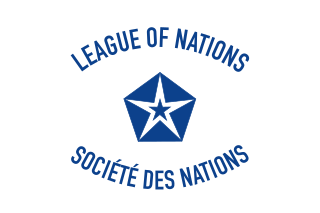
The League of Nations was the first worldwide intergovernmental organisation whose principal mission was to maintain world peace. It was founded on 10 January 1920 by the Paris Peace Conference that ended the First World War. The main organization ceased operations on 20 April 1946 but many of its components were relocated into the new United Nations.

Malcolm X was an African-American Muslim minister and human rights activist who was a prominent figure during the civil rights movement. A spokesman for the Nation of Islam until 1964, he was a vocal advocate for black empowerment and the promotion of Islam within the black community. A posthumous autobiography, on which he collaborated with Alex Haley, was published in 1965.
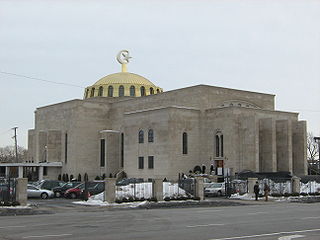
The Nation of Islam (NOI) is a religious and political organization founded in the United States by Wallace Fard Muhammad in 1930. A black nationalist organization, the NOI focuses its attention on the African diaspora, especially on African Americans. While it identifies itself as promoting a form of Islam, its beliefs differ considerably from mainstream Islamic traditions. Scholars of religion characterise it as a new religious movement. It operates as a centralized and hierarchical organization. Its critics, including the Southern Poverty Law Center and the Anti-Defamation League, have accused it of being a black supremacist hate group that promotes racial prejudice towards white people, anti-semitism, and anti-LGBT rhetoric. Muslim critics accuse it of promoting teachings that are not authentically Islamic.
Nationalism is an idea and movement that holds that the nation should be congruent with the state. As a movement, nationalism tends to promote the interests of a particular nation, especially with the aim of gaining and maintaining the nation's sovereignty (self-governance) over its homeland to create a nation state. Nationalism holds that each nation should govern itself, free from outside interference (self-determination), that a nation is a natural and ideal basis for a polity and that the nation is the only rightful source of political power. It further aims to build and maintain a single national identity, based on shared social characteristics of culture, ethnicity, geographic location, language, politics, religion, traditions and belief in a shared singular history, and to promote national unity or solidarity. Nationalism, therefore, seeks to preserve and foster a nation's traditional culture. There are various definitions of a "nation", which leads to different types of nationalism. The two main divergent forms are ethnic nationalism and civic nationalism.

The United Nations (UN) is an intergovernmental organization whose purpose is to maintain international peace and security, develop friendly relations among nations, achieve international cooperation, and be a centre for harmonizing the actions of nations. It is the world's largest and most familiar international organization. The UN is headquartered on international territory in New York City, and has other main offices in Geneva, Nairobi, Vienna, and The Hague.

The United Nations Security Council (UNSC) is one of the six principal organs of the United Nations (UN) and is charged with ensuring international peace and security, recommending the admission of new UN members to the General Assembly, and approving any changes to the UN Charter. Its powers include establishing peacekeeping operations, enacting international sanctions, and authorizing military action. The UNSC is the only UN body with the authority to issue binding resolutions on member states.

The United Nations General Assembly is one of the six principal organs of the United Nations (UN), serving as the main deliberative, policymaking, and representative organ of the UN. Currently, in its 76th session, its powers, composition, functions, and procedures are set out in Chapter IV of the United Nations Charter. The UNGA is responsible for the UN budget, appointing the non-permanent members to the Security Council, appointing the UN secretary-general, receiving reports from other parts of the UN system, and making recommendations through resolutions. It also establishes numerous subsidiary organs to advance or assist in its broad mandate. The UNGA is the only UN organ wherein all member states have equal representation.
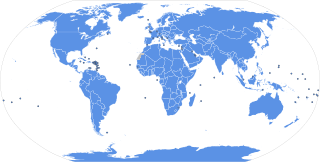
The United Nations member states are the 193 sovereign states that are members of the United Nations (UN) and have equal representation in the UN General Assembly. The UN is the world's largest intergovernmental organization.
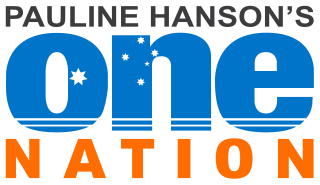
Pauline Hanson's One Nation, also known as One Nation or One Nation Party, is a right-wing populist political party in Australia. It is led by Pauline Hanson.
An ethnic group or an ethnicity is a grouping of people who identify with each other on the basis of shared attributes that distinguish them from other groups. Those attributes can include common sets of traditions, ancestry, language, history, society, culture, nation, religion, or social treatment within their residing area. Ethnicity is sometimes used interchangeably with the term nation, particularly in cases of ethnic nationalism, and is separate from the related concept of races.

The secretary-general of the United Nations is the chief administrative officer of the United Nations and head of the United Nations Secretariat, one of the six principal organs of the United Nations.

Palestine, officially the State of Palestine, is a de jure sovereign state in Western Asia. It is officially governed by the Palestine Liberation Organization (PLO) and claims the West Bank and the Gaza Strip. However, its claimed territory has been occupied by Israel since the Six-Day War of 1967; the West Bank is currently split into 165 Palestinian "islands" under partial Palestinian National Authority (PNA) civil rule, and 230 Israeli settlements into which Israeli law is "pipelined", while Gaza is ruled by Hamas and under a long-term blockade by Egypt and Israel since 2007.
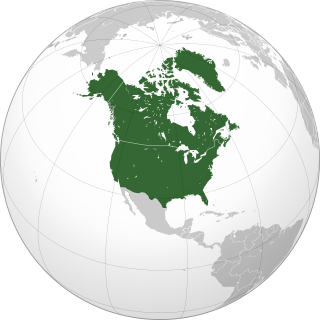
Northern America is the northernmost subregion of North America. The boundaries may be drawn slightly differently. In one definition, it lies directly north of Middle America. Northern America's land frontier with the rest of North America then coincides with the Mexico–United States border. Geopolitically, according to the United Nations' scheme of geographic regions and subregions, Northern America consists of Bermuda, Canada, Greenland, Saint Pierre and Miquelon, and the United States.
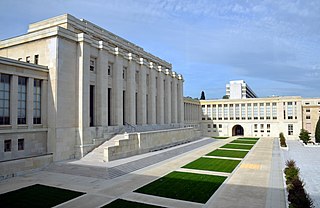
The United Nations Office at Geneva (UNOG) in Geneva, Switzerland, is one of the four major offices of the United Nations where numerous different UN agencies have a joint presence. The main UNOG administrative offices are located inside the Palais des Nations complex, which was originally constructed for the League of Nations between 1929 and 1938.
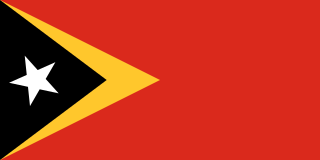
East Timor, also known as Timor-Leste, officially the Democratic Republic of Timor-Leste, is an island country in Southeast Asia. It comprises the eastern half of the island of Timor, the nearby islands of Atauro and Jaco, and Oecusse, an exclave on the northwestern side of the island surrounded by Indonesian West Timor. Australia is the country's southern neighbour, separated by the Timor Sea. The country's size is 15,007 square kilometres (5,794 sq mi). Dili is its capital.

The Sustainable Development Goals (SDGs) or Global Goals are a collection of 17 interlinked global goals designed to be a "blueprint to achieve a better and more sustainable future for all". The SDGs were set up in 2015 by the United Nations General Assembly (UN-GA) and are intended to be achieved by 2030. They are included in a UN-GA Resolution called the 2030 Agenda or what is colloquially known as Agenda 2030. The SDGs were developed in the Post-2015 Development Agenda as the future global development framework to succeed the Millennium Development Goals which ended in 2015.

The Non-Aligned Movement (NAM) is a forum of 120 countries that are not formally aligned with or against any major power bloc. After the United Nations, it is the largest grouping of states worldwide.